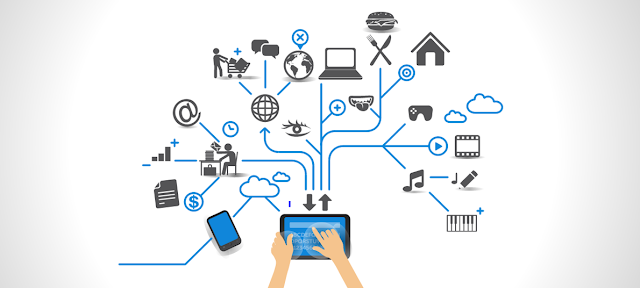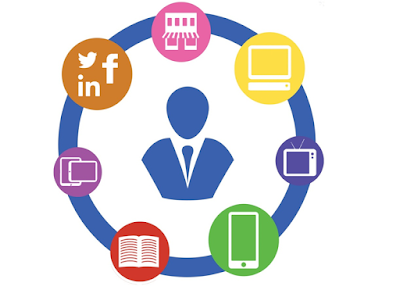Customer Experience in the era of “THE INTERNET OF THINGS”
Customer experience is a pretty common term these days. Everyone claims they do it, technology companies say they have the solution to achieve it, and the story goes on. If we Google the term “Customer Experience”, this is what you get:
“Customer experience (CX) is the product of an interaction between an organization and a customer over the duration of their relationship. This interaction includes a customer's attraction,
awareness, discovery, cultivation, advocacy
and purchase and use of a service.”
Let’s cut
all the noise and look at this from a 30,000
feet perspective…
- Customer Attraction
- Awareness
- Discovery
- Cultivation
- Advocacy, purchase and use of a service
A customer experience can simply be an interaction with a company’s call center, or it can even be the simplest thing
like a greeting you get when you enter a retail store. We all know that customer
experience is important to sustain a company’s existing customer
base and for business
growth, but
the question is ‘are companies & businesses ready for the next technological revolution
which is already happening out there ,
are
they ready to take the customer experience to the next level ?’ ,In the modern age, customers are connected & information is
at
their fingertips. With the ever growing technology revolution of mobility and ample access to the internet, the technology landscape has changed
dramatically. This has
created new challenges for business
to think about their customer
experience strategy & to leverage the power of this new digital world which is connected to everything.
‘THE INTERNET OF THINGS’-
the so-called next technological
revolution which is already transforming our world to something
that could be right out of a sci-fi movie.
What is “THE INTERNET OF
THINGS”?
“The Internet of Things (IoT, sometimes referred to as the ‘Internet of Everything’) is the network of
physical objects or
"things" embedded[1] with electronics, software, sensors[2] and connectivity to
enable it to achieve greater value and service by exchanging data….
According to CISCO, 37
Billion new things will be
interconnected by 2020.
[Image
copyright (website - http://blogs.cisco.com/ioe/answering-the-two-most-asked-questions-about-the-internet-of-everything)?]
This
creates an entire new experience
for the consumer. Remember the Spielberg movie Minority Report from 2002? Below is a snapshot taken from an iconic scene of the movie.
Cruise plays the character of “John Anderson”, and the
above scene shows Anderson entering a shopping mall; as he enters the shopping
mall a holographic host greets Anderson and asks him how the previously purchased “tank tops” were? The host also introduces a few more products which Anderson might be interested in. Even though the entire hologram concept might be a few years ahead, the underlying concept is already prevalent in modern day businesses. It’s all part of the modern day customer
experience professionals role
to understand a customer’s preferences and to have holistic
understanding of the customer. Having
a customer profile is the basic concept of CRM (Customer Relationship
Management), but to take it to the next level requires
a lot
more innovation,
and IOT (Internet of Things) plays a
big part in this.
Nowadays
customers & business are connected
like never before. If we go back to
the late 80’s & early 90’s, the primary communication channel
between a business
and their customer was the telephone, and to a lesser extent, email too. But today, consumers are on digital channels such as social,
apps, and IM chat. This
creates an entirely new paradigm of personalized experience for customers. Clever businesses are now
adapting to social networking to listen to
what customers say, &
to understand customer behavior.
Technology giants
who practiced CRM now focus on Social
CRM. Businesses use Social
CRM to engage with their customers digitally.
Everyone has heard of a smart
watch. But what really is a smart watch? Apart from it giving
us the time which it should do, it’s actually a miniaturized
version of a smart phone.
It
synchs up with your mobile device and gives you certain notifications and summarized info. If we look at the practicality of the smart watch, one can argue that there is no need of a device category of this nature; it proceeds similar (and usually less) functionality
as a
smart phone. But
it has created an all new medium
for Customer Experience. Now businesses can create their own smart watch apps to enhance
their customer’s experiences. The launch of the apple watch and watch OS2 is a good example for this.
[Image
taken from apple special event- 2014 September]
Apple
has now introduced
’Apple Pay’, its proprietary virtual currency
platform to the Apple Watch. Along with loyalty module embedded
to it
The
era of the smart watches open new doors to make a customer’s life more convenient
As shown in the cartoon
drawing above, the nightmare of carrying loyalty cards is long gone; customers can simply hold their
smart watch or smart phone and redeem the points.
[Image
copyright: http://www.capital-moments.com/apple-pay-launches-in-the-u-k/]
Airline passengers
can now check-in with their smart watches. This cuts down all the paper work which is involved in
the process, and makes life easier for the passenger.
This
not only creates a new experience to the customers, it also helps businesses to track their customers individually, to know more about
their customer, to identify their individual preferences & buying patterns. This is only the tip of the ice berg - other
possible use cases
could be something along the lines of your running
shoes being able to identify your health status and triggering notifications accordingly trough the nearest supermarket via an app, and the
goods are delivered right to your door step. The supermarket keeps a track of the customer’s buying patterns and provides
loyalty points. These loyalty points
will then be notified via one
of the customer’s smart devices such as a smart
watch or smart phone. Or
maybe your t-shirt would be able to identify certain
illnesses or viruses which enters the human
body
through body heat, heart-beat etc, via special sensors. And
this information will be pushed to your family doctor via an
app. The app will be able to automatically set appointments and so on. Some of these use cases might have already being implemented in a real world scenario,
and some will be implemented in the near future. But this is where the future is headed. Every device, every home appliance, every one of our favorite
gadgets are going to be connected to this
gigantic hub where all of these
“things” share information. The information will be grabbed by smart analytical tools to provide predictions and patterns. The world is going
to be a lot smarter.
In the future we cannot simply
say we are providing
a Customer Experience or a CRM solution by just providing a customer profile or a 360 Degree view;
we
will definitely need to think about IOT and the new digital
landscape. We will need to
think of new concepts with the
smart devices connect to IOT,. Enable all customer
interactions as one omni channel & to create a true modern day customer
experience.
[Image copyright: http://blog.payvision.com/cross-border-ecommerce-in-china-omnichannel-and-localization/]











Comments
Post a Comment